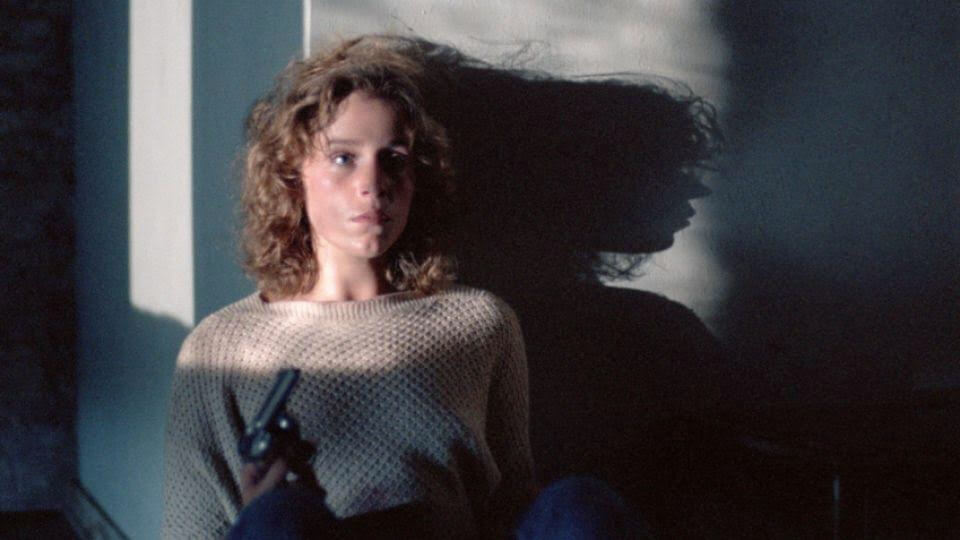‘Blood Simple’ It begins with one of those opening narrations — the ones professors and critics will kill you for including, but which the Coen brothers do as often and as enthusiastically as they can. M. Emmett Walsh — as slimy private dic Visser, though he’s never called any name onscreen — growls about how “the world is full of complainers.” He brays about how no one’s better than anyone else — not “the Pope in Rome, the President of the United States or the Man of the Year.” He’s setting up “Blood Simple,” the Coens’ debut film, the little indie that could and did: Its success birthed them as a truly maverick brand. But Visser is also setting up the Coens’ entire career, their entire worldview. Since “Blood Simple” emerged out of almost nowhere in 1984 — and since been theatrically reissued twice, both times in a shorter, the Coens promise tighter cut — they’ve been dogged with that old canard: all style, no substance. Their films are tight to a fault, all flash, filled with wretched grotesques who are more cartoon than man. Thing is, they were upfront about revealing their substance. In only six sentences uttered by Walsh, they set up what they’ve explored over the course of their first film and the 16 and counting that followed: That even if there is a god, no one’s minding the store, and humans are insignificant dots biding time before disappearing into the ether. They may wrong each other, kill each other or, sometimes, love each other. But no matter what they do they’re spinning their wheels until the end comes. That imposes a lot of import upon “Blood Simple,” which was born modestly: Two 20-something brothers thought it’d be fun to make a film. Joel and Ethan Coen were NYU film grads who weren’t doing much with their degrees. The older, long-haired one, Joel, had worked as an assistant director on “The Evil Dead,” Sam Raimi’s own ramshackle debut, from which the Coens would swipe a neato trick: unable to afford a crane, they’d get dynamic shots by placing the camera on a 12-foot-long pole and have the two people holding it run. Horror was an easy way for a budding filmmaker to get a foot in the door. But they didn’t want to do that. Fans of the big three pulp lords (Hammett, Chandler, Cain), they decided on a neo-noir, but in color, because they felt that would look less cheap. For actors, they didn’t want to go the no-name non-pro route, as Raimi had done, even if he had lucked out with Bruce Campbell. They wanted affordable pros (Walsh, Dan Hedaya) and hungry newbies, including John Getz and, when her roommate Holly Hunter proved unavailable, Frances McDormand. (Hunter made a sort of cameo, playing a voice on an answering machine message.) The small but ambitious movie they made wouldn’t be any easier to sell. It was a time when the old dinosaurs were dying, namely the ’70s auteurs, whose dominion over Hollywood had been shut down thanks to hubris and crumbling box office numbers. A new breed was taking over, except they settled for the margins of the mainstream: Jim Jarmusch and John Sayles had just had art house hits with “Stranger Than Paradise” and “Brother from Another Planet.” But “Blood Simple” wasn’t art house, and it wasn’t Hollywood. It was closer to an old low-budget noir, a genre that hadn’t been in vogue for ages. It was thrilling, with a knock-off pot boiler plot and creative-cool visuals, like the gun-shots that create strobes of light through a cheap wall into a darkened room — the very sight that drove super-producer Joel Silver to later let them make “The Hudsucker Proxy.” But it was also demanding: patiently paced, subtle in its thrills and filled with no single character who was wholly likable. RELATED: Interview: Samuel L. Jackson on “Tarzan” and fearing the fallout from Brexit The audience has to work in “Blood Simple,” and its niftiest trick may not be apparent till the lights have come up: No single character knows entirely what’s going on until the end, when only two of the main quartet are left (and one just barely). The story in brief: Hedaya’s sleazy, chained Texan bar owner wants to kill both his wife (McDormand), and the employee (Getz) sleeping with her. He hires Visser to do the deed, but he betrays him. What follows is a slow and steady wave of mutilation, enacted by people who often misinterpret situations, because, unbeknownst to them, they’re missing several pieces of the puzzle. “Blood Simple” isn’t a comedy, and, in fact, the Coens, in post, removed most of the funny bits they had shot. But the final event (vague spoiler ahoy!) is a sick joke of cosmic proportions: one person fatally shoots someone they never met and never knew existed, mistaking them for someone else (who, as it were, is already dead). This is the world Visser talks about in that opening: As in every Coen film that follows, each character thinks they’re in charge of their destiny. But they’re just kidding themselves. There’s every chance they could be undone by machinations outside their control, sometimes by people they’ve never met. They’re all silly creatures whose irrational and/or foolish behavior is being observed, with no small bemusement, by some cruel deity. There’s no Coen Brothers Cinematic Universe, no characters swinging into other films for cameos or rounding them all into a renegade team. But they all of them reside in the same world, whether they’re a self-serious writer (“Barton Fink”), a be-robed pothead (“The Big Lebowski”), a taciturn barber (“The Man Who Wasn’t There”) or a gruff folkie (“Inside Llewyn Davis”). They may be different, but they’re all complainers. And though Visser talks about Texas the same way he talks about Communist Russia (or another character Ancient Greece), it’s clear Texas is just part of a bigger universe, one created by and lorded over by two filmmakers who are going to make their lives hell, all to remind us that, ultimately, we all suffer, we all die and we’ll all of us be forgotten.
Director: Joel Coen
Stars: Frances McDormand, John Getz
Rating: R
5 (out of 5) Globes
‘Blood Simple’ kicked the Coen brothers’ career off in bleak fashion

Janus Films
Follow Matt Prigge on Twitter @mattprigge


















